democracynow.org
Stories:

Winning His Race: Is Trump the Poster Child for the Rise of U.S. Hate Groups?
Donald Trump is the front-runner as he enters the final Republican presidential debate ahead of next week’s Super Tuesday primary. He is also featured on the cover of a new report by the Southern Poverty Law Center, "The Year in Hate and Extremism." We speak with SPLC President Richard Cohen, who notes that "[o]ver 60 percent of the people who support Trump believe that President Obama is a secret Muslim and wasn’t born in this country." The report points to the presidential election cycle as one of the primary reasons for the rising number of hate groups across the U.S., saying last year was marked by a level of hate speech in mainstream politics not seen in decades. The Investigation Discovery network will premiere a series titled "Hate in America," based on the work of the Southern Poverty Law Center, this Monday, February 29, at 8 p.m. Eastern.
TRANSCRIPT
This is a rush transcript. Copy may not be in its final form.
NERMEEN SHAIKH: Tonight, [ five ] Republican presidential contenders will face off in Houston during the final debate ahead of next week’s Super Tuesday primary, when delegates in Texas and 10 other states, along with American Samoa, will be at stake. This comes as billionaire businessman Donald Trump easily won the Nevada caucus Tuesday night, capturing 46 percent of the vote in his third consecutive victory. Trump thanked supporters during a victory speech in Nevada.
DONALD TRUMP: So, we won the evangelicals. We won with young. We won with old. We won with highly educated. We won with poorly educated—I love the poorly educated—with the smartest people, with the most loyal people. And you know what I really am happy about? Because I’ve been saying it for a long time—46 percent with the Hispanics, 46 percent, number one with Hispanics. I’m really happy about that. So—
TRUMP SUPPORTERS: Trump! Trump! Trump! Trump! Trump! Trump! Trump!
NERMEEN SHAIKH: Donald Trump will be one of five candidates who face off in tonight’s debate. Well, Donald Trump is featured in a new report just published by the Southern Poverty Law Center called "The Year in Hate and Extremism." Its cover includes an image of Trump in front of a microphone. The report details how the number of hate groups rose 14 percent last year, bringing the total number of hate groups in the U.S. to nearly 900. It found the number of Ku Klux Klan groups more than doubled. It also documented 34 anti-Muslim hate groups and 48 anti-LGBTQ hate groups.
AMY GOODMAN: The Southern Poverty Law Center points to the presidential election cycle as one of the primary reasons for the rising number of hate groups across the U.S., saying last year was marked by a level of hate speech in mainstream politics not seen in decades. It notes, quote, "Donald Trump’s demonizing statements about Latinos and Muslims have electrified the radical right, leading to glowing endorsements from white nationalist leaders such as Jared Taylor and former Klansman David Duke. White supremacist forums are awash with electoral joy, having dubbed Trump their 'Glorious Leader.'" The Investigation Discovery network will premiere a series titled Hate in America, based on the work of the Southern Poverty Law Center, this Monday, February 29th.
Well, for more, we’re joined by the center’s president, Richard Cohen.
Welcome back to Democracy Now! It’s great to have you for the first time in our studio—
RICHARD COHEN: Thank you, Amy.
AMY GOODMAN: —on our 20th anniversary.
RICHARD COHEN: Perfect!
AMY GOODMAN: So, talk about this report. The picture right here, "The Year in Hate and Extremism," with the major face on the cover, Donald Trump, in front of a microphone.
RICHARD COHEN: I’m not sure that Mr. Trump would object to being center stage. He never seems to. And it’s been an unusual time. You know, usually in the white supremacist world, the attitude is "a pox on both their homes; you know, the system is incredibly corrupt." This time, you know, as you said, people are very, very excited about Trump. They call him the glorious leader. And it’s all about the immigration issue.
AMY GOODMAN: Who is "they"?
RICHARD COHEN: People like Jared Taylor.
AMY GOODMAN: And explain who Jared Taylor is.
RICHARD COHEN: Jared Taylor is a longtime white nationalist. Most recently he came into the public mind because he served as the spokesperson for the Council of Conservative Citizens. That was the hate group whose Kool-Aid Dylann Roof drank when he was radicalized. So, you know, he has been a real fixture on the white supremacist scene and a very influential one.
NERMEEN SHAIKH: So could you talk about some of the main findings of the report?
RICHARD COHEN: Sure, sure. Well, first, you know, we saw an increase in the number of hate groups in the country, going from about 800 to 900. We also saw a similar increase of 14 percent to about a thousand of these radical antigovernment groups, the people who believe that, you know, there are FEMA camps that are awaiting is, that people are trying to make us into the New World Order. Secondly, we saw a really incredible level of violence last year, what was the massacre in Charleston, most well known, but really scores of events, some quite deadly. And lastly, of course, the mainstreaming of hate in the political campaign and by pundits on the airwaves.
AMY GOODMAN: What about—what about the media’s role, Richard?
RICHARD COHEN: I mean, the media amplifies the hate that’s out there. They give—you know, every time Donald Trump starts talking about rapists from Mexico and whatnot, it’s blasted all over the air. It coarsens, you know, kind of, our society. It makes it almost acceptable to talk that way.
NERMEEN SHAIKH: And you say in the report that the radical right has shifted its principal base to the Internet. Why is that important?
RICHARD COHEN: Well, you know, it used to be the case that if you wanted to get your fill of hate, you’d go to a Klan rally or cross burning. Nowadays you can do it from your home, and you have the—you know, it’s easier, and you have the benefit of anonymity. And we’ve seen, during President Obama’s administration, a tremendous increase in the number of persons who were online haters. Stormfront, which is the most important online forum for hate members, has grown by 100 percent since Obama has been in office. This is—these are 300,000 people, who don’t just visit—millions visit—but 300,000 people who have signed up and—you know, for posting privileges, so they can spew their venom daily.
AMY GOODMAN: You talk about terrorist attacks and radical plots—
RICHARD COHEN: Yeah.
AMY GOODMAN: —proliferating.
RICHARD COHEN: Yes.
AMY GOODMAN: We’re not talking about ISIS.
RICHARD COHEN: No.
AMY GOODMAN: So, explain exactly what we’re talking about.
RICHARD COHEN: Well, you know, we did a report and showed that there was a terrorist attack or a domestic incident, domestic terrorism, about once every 34 days over the last five years. Some of these attacks of course are, you know, kind of well known, like the massacre in Charleston, the—
AMY GOODMAN: At the Emanuel Church.
RICHARD COHEN: Right—the killings in the Planned Parenthood. But I just think people don’t get a sense of, you know, how—
AMY GOODMAN: In Colorado Springs.
RICHARD COHEN: Yeah—how common these things are.
NERMEEN SHAIKH: Well, some have criticized the methodology used in the SPLC report. Vanderbilt University political science professor Carol Swain has argued that the SPLC is too all-encompassing, saying they, quote, "paint with a very broad brush, and in the process they tend to sweep up people that are politically conservative. ... I think they do it in a very harmful way and they abuse their power as an organization." She goes on to say, quote, "These are individuals that are Christian conservatives—they’re just traditional conservatives—but because of their position on LGBT issues, the Southern Poverty Law Center finds ways to malign these individuals or their organizations." Richard Cohen, your response to this criticism?
RICHARD COHEN: Well, our methodology is well known. We call groups hate groups when they vilify entire groups of people because of their immutable characteristics. You know, Focus on the Family is a very conservative Christian organization, and we certainly don’t call them a hate group. But we would call groups that spread demonizing lies about the LGBT community, lies such as, you know, pedophilia is a problem for the gay community, or the American Family Association saying that, you know, gay people brought us the Holocaust and black people rut like rabbits—I think that you can call yourself the American Family Association, you can wrap yourself in the Bible, but when you say things like that, I think you deserve the moniker of a hate group.
NERMEEN SHAIKH: Well, you also say that—the report says that there has been a 14—which we’ve talked about—14 percent increase in hate groups—
RICHARD COHEN: Yes.
NERMEEN SHAIKH: —in 2015. But the report also indicates that that’s probably an underestimation.
RICHARD COHEN: Yeah.
NERMEEN SHAIKH: Could you explain?
RICHARD COHEN: Well, you know, our methods of detecting hate groups aren’t foolproof. And we certainly—there’s obvious an undercount. Also, it doesn’t take into account, you know, the hundreds of thousands of people who aren’t formally affiliated with hate groups but have hate in their hearts. It’s just one indicator of the level of rage, the level of vitriol, that exists in the country.
AMY GOODMAN: Last year, Donald Trump faced criticism after a town hall in New Hampshire when, during the Q&A, one of his supporters stood up and said President Obama is a Muslim and not even an American, and asked when the United States could get rid of Muslims.
DONALD TRUMP: OK, this man. I like this guy.
TRUMP SUPPORTER: I’m from White Plains. Amen, OK? We have a problem in this country. It’s called Muslims. We know our current president is one.
DONALD TRUMP: Right.
TRUMP SUPPORTER: You know he’s not even an American. Birth certificate, man.
DONALD TRUMP: We need this question; this is the first question.
TRUMP SUPPORTER: But anyway, we have training camps brewing where they want to kill us.
DONALD TRUMP: Mm-hmm.
TRUMP SUPPORTER: That’s my question: When can we get rid of them?
DONALD TRUMP: We’re going to be looking at a lot of different things. And, you know, a lot of people are saying that, and a lot of people are saying that bad things are happening out there. We’re going to be looking at that and plenty of other things.
AMY GOODMAN: Your response to what Donald Trump said in this town hall meeting, Richard Cohen?
RICHARD COHEN: Well, I’m not surprised by the supporter who stood up. Over 60 percent of the people who support Trump believe that President Obama is a secret Muslim and wasn’t born in this country. So, you know, none of that surprises me. You know, what we’re hearing on the campaign trail, what is leading to the increase in the number of hate groups in our country, is the changing demographics of our country. It’s changing rapidly. And I think, you know, many white people feel like the tide is turning against them. And so we have a reaction to that. We see the reaction in the vilification of Muslims. We see the reaction to it in the vilification of kind of Hispanics. You know, a generation ago, it was the Southern strategy. Now, you know, it’s—different people are targeted.
AMY GOODMAN: How does Oregon fit into this, the standoff that was just finished with the death of the spokesperson and the others in jail?
RICHARD COHEN: Well, I think what really fits into it is what happened on Cliven Bundy’s ranch. You know, he refuses to pay his grazing fees, doesn’t pay his fines. They point—
AMY GOODMAN: This is in Nevada.
RICHARD COHEN: Yeah. They point guns at federal officials, and nothing happens. And so, as a result, the antigovernment patriot organization group grows tremendously and are emboldened. Then they show up in Oregon and take over that—that compound. And, of course, they eventually arrested Cliven Bundy, but they could have arrested him the day after the standoff in Nevada. And I think it was the failure of the federal officials to move more quickly, originally, that led to the explosion in antigovernment groups and led to the situation in Oregon.
NERMEEN SHAIKH: But what are some of the other factors? Because the report talks about how many Americans are now antigovernment.
RICHARD COHEN: Yes.
NERMEEN SHAIKH: What do you think accounts for this growth in suspicion of the government, in addition to what you pointed out? Do you think that having the first, for example, African-American president has contributed to that?
RICHARD COHEN: I think that’s absolutely right. We’ve seen this tremendous increase in the number of antigovernment groups during President Obama’s tenure. You know, there was a big increase during the time of Bill Clinton, then it went down during George Bush’s presidency, and now it’s shot up again under President Obama’s tenure. And there’s also—you know, this changing demographics makes people less trustful of the efficacy of collective action. It’s kind of a well-known sociological fact. And, of course, the vehicle of collective action in our country, perhaps the most important vehicle, is the government itself. So people have lost confidence in institutions.
AMY GOODMAN: And the collapse of the economy for many, not for all.
RICHARD COHEN: Absolutely. You know, we kind of—white working-class people, you know, their prospects aren’t nearly as good as they were a generation ago. And so there’s a tremendous amount of angst and anger in the country as a result.
AMY GOODMAN: On Monday, Investigation Discovery will air a new documentary series called Hate in America: Klan on Trial, recounting the story of Michael Donald, the victim of brutal Klan violence in Mobile, Alabama, in the early ’80s. The SPLC took the case and helped bring down the United Klans of America. This is the trailer for the series.
NARRATOR: When hatred leads to murder...
TONY HARRIS: Why did they do all that?
UNIDENTIFIED: He died just because the color of his skin.
NARRATOR: ...something needs to be done.
MORRIS DEES: I would like to bring the United Klan to justice.
NARRATOR: ID presents the heroes who overcame the hate...
UNIDENTIFIED: She was the face, the woman that beat the Klan.
NARRATOR: ...and found a way to fight for justice.
UNIDENTIFIED: This is bigger than just our family.
NARRATOR: Hate in America: The Klan on Trial, all new special.
AMY GOODMAN: Hate in America: The Klan on Trial. As we wrap up, Richard Cohen, what are you hoping will come out of this series that you’re doing?
RICHARD COHEN: You know, we’re trying to shine a light on the reality of hate in America, so, you know, people don’t turn their backs, people don’t become apathetic, and people decide or try to build bridges across the racial divide, across the ethnic divide. We’re a better country than what Donald Trump says. You know, what makes America great is not building walls, it’s building bridges.
AMY GOODMAN: When Donald Trump retweets a white supremacist, what is the problem with that when he says, "I don’t know their background, I just liked something they said"?
RICHARD COHEN: Well, it’s wild. You know, one of the things he retweeted was—the hashtag was #WhiteGenocide. I don’t know how you can claim ignorance when it’s—the hashtag is #WhiteGenocide. It’s kind of a well-known meme in the white supremacist world, having to do with the idea that white people under attack. People like Dylann Roof and other killers have bought into that, and they’re striking out. It’s crazy to say he didn’t know what that meant.
AMY GOODMAN: Well, Richard Cohen, I want to thank you for being with us, president of the Southern Poverty Law Center, just released its annual report, "The Year in Hate and Extremism," the cover featuring Donald Trump in front of a microphone. The ID network, Investigation Discovery, will be premiering a series titled Hate in America, based on the work of the Southern Poverty Law Center. The first of the series begins Monday, February 29th, at 8:00 p.m. Eastern.
This is Democracy Now! When we come back, the FBI tries to take a bite out of Apple. We’ll talk with a former covert CIA operative who’s now a thriller writer. His latest book is The God’s Eye View. New York Times best-selling author, Barry Eisler will join us. Stay with us. ... Read More →
Former CIA Agent Says Edward Snowden Revelations Emboldened Apple to Push Back Against FBI
We speak with former CIA agent Barry Eisler about the role of Edward Snowden in raising public awareness about encryption and privacy ahead of the FBI’s push for Apple to break the encryption of the iPhone of one of the San Bernardino shooters. "So much of Snowden’s revelations were about this very thing. And the fact that the public knows about corporate cooperation with the government now is in part, I think, what has emboldened Apple to push back," Eisler says. "If we didn’t know about these things, I would expect that Apple would be quietly cooperating. There would be no cost to their doing so." Eisner also discusses his new novel, "The God’s Eye View," which he says is "grounded in things that are actually happening in the world. … I realized I was not going nearly far enough in what I had imagined."
TRANSCRIPT
This is a rush transcript. Copy may not be in its final form.
NERMEEN SHAIKH: Well, let’s turn to NSA whistleblower Edward Snowden. In a 2013 interview with The Guardian just after his identity was revealed, Snowden explained why he risked his career to leak the documents.
EDWARD SNOWDEN: I think that the public is owed an explanation of the motivations behind the people who make these disclosures that are outside of the democratic model. When you are subverting the power of government, that that’s a fundamentally dangerous thing to democracy. And if you do that in secret consistently, you know, as the government does when it wants to benefit from a secret action that it took, it will kind of get its officials a mandate to go, "Hey, you know, tell the press about this thing and that thing, so the public is on our side." But they rarely, if ever, do that when an abuse occurs. That falls to individual citizens. But they’re typically maligned. You know, it becomes a thing of these people are against the country, they’re against the government. But I’m not. I’m no different from anybody else. I don’t have special skills. I’m just another guy who sits there, day to day, in the office, watches what happening—what’s happening, and goes, "This is something that’s not our place to decide. The public needs to decide whether these programs and policies are right or wrong." And I’m willing to go on the record to defend the authenticity of them and say, "I didn’t change these. I didn’t modify the story. This is the truth. This is what’s happening. You should decide whether we need to be doing this."
NERMEEN SHAIKH: That was NSA whistleblower Edward Snowden speaking in 2013. So, Barry Eisler, you begin your book with Edward Snowden. Could you talk about that decision to talk about Edward Snowden?
BARRY EISLER: Sure.
NERMEEN SHAIKH: And also, the title of your book is The God’s Eye View.
BARRY EISLER: Yeah. So, like all my fiction, but especially so in this case, it’s grounded in things that are actually happening in the world. And when I first had the idea for this book, by the way, I had a notion for a pretty far-reaching surveillance program, and I thought it would make the good basis—a good basis for a novel. My concern was that what I had in mind was going to be too far-reaching. And because my brand has a lot to do with realism, I thought people might say, "Come on, Barry, the government’s not really doing all that." And while I was working on my previous book but just kind of thinking about this next one, I was actually in Tokyo doing research. June 2013 is when Glenn Greenwald and Laura Poitras first broke—first started breaking stories with The Guardian based on Snowden’s revelations. And I was immediately electrified, and I realized, "Oh, my god! I was not going nearly far enough in what I had imagined."
AMY GOODMAN: Now, I mean, what’s interesting is you’re a fiction writer here.
BARRY EISLER: Right.
AMY GOODMAN: But your background is CIA—
BARRY EISLER: Yeah.
AMY GOODMAN: —in covert operations.
BARRY EISLER: Right.
AMY GOODMAN: So, you begin this book with Poitras and Greenwald meeting with Snowden in Hong Kong, complete catastrophe for the intelligence agency here.
BARRY EISLER: Right.
AMY GOODMAN: They’re woken up in the middle of the night: "What do we do?" And the discussion of just taking them all out—
BARRY EISLER: Right.
AMY GOODMAN: —including Ewen MacAskill, who is from The Guardian, who was with them.
BARRY EISLER: Right.
AMY GOODMAN: Taking them out.
BARRY EISLER: Yeah.
AMY GOODMAN: But you do have a background in reality, which is in covert operations.
BARRY EISLER: Right, yeah. So, if you’re asking me, have I ever heard the government give an order to kill a journalist, the answer is no. But I do know that, increasingly, the government equates journalism with terrorism—I mean, explicitly. And if we’re using certain tools and tactics against terrorists, then it makes sense those things are going to migrate to other enemies of the state, right? In fact, I think that when you think about terrorist groups like ISIS and then power centers in countries like America, a group like ISIS is nothing but ISIS—is nothing but upside to any political establishment figure who wants to increase his or her budget, or up fear among the public so that the politician can gain more power, and means more profits for corporations involved in the war machine—really, nothing but upside.
But dissident groups—student groups, antiwar groups, civil rights activists—represent a lot of downside. And this is—and journalists, most of all, who are relying—real journalists, who are relying on whistleblowers and real leaks to carry out their journalism. So, when I imagine how is the government going to respond to this kind of thing, I’m thinking, well, how does the government respond to—what sort of tools has it developed and has it deployed against the ostensible enemies of the government, and how is it going to deploy them against real enemies, like journalists?
AMY GOODMAN: How were you deployed in the CIA?
BARRY EISLER: I didn’t do very much with the CIA. And whenever I say that, people are like, "Yeah, right." It’s like when a presidential candidate says, you know, "I have no intention of running for president," and people are like, "Oh, come on, man! You know, when are you really going to"—it really—I was there for barely three years. It was mostly training. It was a super-interesting experience. I’m glad I had it. And it definitely informs everything I write about, and hopefully makes the sort of spycraft, countersurveillance, surveillance, all sorts of tradecraft and the mentality of spies, that sort of thing that I depict in my novels—hopefully, the experience I had with the CIA makes all that as realistic as possible. But I wish I could say on Democracy Now! that I was involved in numerous coups and assassinations. It would be a really cool segment we’re doing. But alas, it was mostly training.
NERMEEN SHAIKH: But one of the things that you’ve said that you learned at the CIA was that sometimes it pays to cover up the commission of a serious crime—
BARRY EISLER: Yeah.
NERMEEN SHAIKH: —by confessing to a lesser one.
BARRY EISLER: Yes. And it’s funny how often I see that sort of thing played out in national headlines. There are things they say at the CIA that are said partly in jest, but only partly. So, another one is it is better to seek forgiveness than ask permission. And I see the government doing this sort of thing constantly. And yeah, so, some of these things you really do—another one is deny everything, you admit nothing, make counter-accusations. Keep that one in mind. You will see the government doing it, you’ll see politicians doing it all the time.
AMY GOODMAN: So, The God’s Eye View, what is it?
BARRY EISLER: Well, I don’t want to give away any spoilers, but God’s Eye is a program of far-reaching surveillance in the book. And—
AMY GOODMAN: And this is a fiction book?
BARRY EISLER: Well, I have an 18-page bibliography at the end of the book, because I want people to know that if you don’t follow these things closely, you might have—you might have that reaction I was talking about earlier, which is, you’ll read the book and say, "Well, that was—that was a fun, entertaining thriller, but come on. Can the government really do these things? Is it really doing these things?" And reviews thus far have been really gratifying for me, because people do respond to the book the way I would hope they would respond to fiction: They enjoy it, it’s gripping, they’re on the edge of their seats, and then they say, "And then I came to the bibliography, and I realized, oh, my god, all these things are real." They are real. I speculated a little bit about how a program like God’s Eye would be deployed, but all the technologies I describe in the book—and there are some that will make your hair stand up—they’re real, and they’re actually deployed.
AMY GOODMAN: Like?
BARRY EISLER: Can you hack into a car? Can you turn a microphone on, not just on a phone, but on all these personal assistant devices that are getting deployed in people’s homes—baby cameras, closed-circuit television, all over the—
AMY GOODMAN: [inaudible]
BARRY EISLER: Yeah, heart devices, pacemakers, these sorts of things. In my very first book, which I started writing in 1993—it was published in 2002—A Clean Kill in Tokyo, my half-American, half-Japanese assassin, John Rain, shorted out a guy’s pacemaker wirelessly. And at the time, there was no Bluetooth, it was all—I was using infrared, but it was wireless. And I checked with a Harvard cardiac pacemaker specialist, a guy I lived with in college, actually. I said, "Could you really do this?" And he’s like, "Well, I guess so. Why would you want to?" as people always asked me at the time. Now they know I’m a novelist. Anyway, yeah, it turns out you can absolutely do this, so much so that Dick Cheney, in his memoirs, acknowledged that he had his heart doctor turn off the wireless feature on his pacemaker because of concerns that somebody might try to turn it off. I was going to say "terrorist," but actually probably there a lot of people who probably, at one time or another, considered pressing the button on that.
NERMEEN SHAIKH: Well, very quickly, before we conclude, I want to ask you about something you said earlier, that the government increasingly equates journalism with terrorism.
BARRY EISLER: Yeah.
NERMEEN SHAIKH: How did you learn that?
BARRY EISLER: Just by observing. I remember when David Miranda was detained at Heathrow. I guess this was about two years ago.
AMY GOODMAN: Glenn Greenwald’s partner.
BARRY EISLER: Right. And I wondered, why is the government doing this? I mean, they must know. It’s not like he’s got the only copy of whatever it is they’re looking for, so why do something like that? And I realized, look, this is basically a deny-and-disrupt operation. I mean, why does the government want terrorists to know that it’s into their cellphones, that it can track you by your cellphone use and probably put in a drone strike based on that information? In fact, we know that sort of thing goes on, whether it’s a so-called signature struck, where they don’t know your identity, or where they do. Why do they do that? Is it to make terrorists unable to communicate? No, it won’t have that effect. It’s to make it more difficult for them to communicate, to make plotting whatever the terrorists are trying to plot slower and harder. And that’s why the government does these things. So I thought, why detain this guy? Well, it’s—
AMY GOODMAN: Under the Terrorism Act.
BARRY EISLER: Yeah, I know. So, this is another—thank you. That is the quintessential example of like, "Oh, wow, so journalists really are literally terrorists," in this case to the U.K. government, but in cooperation with the American government. So, they’re not going to stop journalists from communicating by this, but it’s a kind of signal. They know that for the most sensitive things that journalists are working on, journalists don’t trust their cellphones, and they’re using human couriers. So what do you do? You let them know even human couriers are not going to be safe for you. Deny and disrupt.
AMY GOODMAN: I wanted to end by asking you a question that our colleague, Jeremy Scahill, asked you last night—
BARRY EISLER: Yeah.
AMY GOODMAN: —in a Q&A that you had here in New York. And it’s about something that the Clinton campaign is trying to make a big deal of, something Bernie Sanders said decades ago—
BARRY EISLER: Oh, yeah.
AMY GOODMAN: —calling the CIA a dangerous institution that has got to go. He said this in 1974.
BARRY EISLER: Yeah, yeah.
AMY GOODMAN: Now, he is not saying that today. These days, he talks about more oversight for the agency.
BARRY EISLER: Right.
AMY GOODMAN: But as a former person in covert operations at the CIA—
BARRY EISLER: Yeah.
AMY GOODMAN: —do you share his view more, the one he expresses today, more oversight, or the one he expressed 40 years ago, do away with the CIA?
BARRY EISLER: Yeah, I would say, first, that people need to understand Sanders is not an outlier in calling for the abolishment of the CIA. President Truman said he’d get rid of the agency. John F. Kennedy famously said he would shatter the organization into a thousand pieces and scatter it to the winds. This is following the Bay of Pigs. A lot—Daniel Moynihan said, "Oh, my god! We’re not getting our money’s worth. This thing is doing more harm than good."
AMY GOODMAN: The senator.
BARRY EISLER: Yeah, Senator—former Senator Moynihan. So there have been a lot of prominent people who have had—who have been in a position to weigh the costs and benefits of the CIA’s existence, and have come out thinking that, on balance, national security would be improved if we actually just didn’t have a CIA. So that is a perfectly defensible and respectable position. That’s one thing.
The other thing is, look, at a minimum, if I were advising Sanders today, I would say, at a minimum, you’ve got to detach the covert action arm from the intelligence gathering and analysis arm. It’s just—these are two things that inherently don’t function well together. Just as the NSA is tasked with, on the one hand, destroying encryption, and on the other hand, there’s another part of the organization that is tasked ostensibly with improving encryption, you can’t put—that’s like putting a humidifier and a dehumidifier in the room and telling them to battle it out. It’s just like—it doesn’t work. You’re not going to get good results. And so, with the agency, the covert military arm of the agency really should be put in the military. It shouldn’t be in a position to interfere with the objectivity of intelligence analysis that our policymakers rely on.
AMY GOODMAN: Well, Barry Eisler, I’d like to ask you to stay afterwards so we can continue this conversation. He is author of The God’s Eye View. He’s a New York Times best-selling author, and he is a former CIA agent. We will continue the conversation after the show and post it at democracynow.org.
But when we come back, we’re going to talk to a journalist who was just detained. She was detained by the U.S.-backed government in Bahrain. This is her first interview since. Stay with us. ... Read More →
Will FBI Take a Bite Out of Apple? Former CIA Agent on Showdown Between Apple & U.S. Government
As the government continues to take a bite out of Apple, Apple CEO Tim Cook says the FBI’s request to unlock the iPhone of one of the San Bernardino shooters is the "software equivalent of cancer." In an interview on ABC, he explained why the tech giant is resisting a court order to help unlock the phone. The FBI says Apple is overstating the security risk to its devices, and argues the litigation is limited. "It won’t be unique to this one phone. It would be something that the government can use against any phone. And even if you think that it’s OK for the government to be able to break the encryption of anybody’s phone … what backdoor is accessible to the U.S. government would also be accessible to whatever is the American enemy du jour," says our guest Barry Eisler, who has written about government surveillance in fictional form. He is also a former CIA agent. Eisler is the author of several books, most recently, "The God’s Eye View."
TRANSCRIPT
This is a rush transcript. Copy may not be in its final form.
NERMEEN SHAIKH: We turn now to the ongoing dispute over privacy and encryption between the FBI and the computer giant Apple. In an interview last night on ABC, Apple CEO Tim Cook explained why his company is resisting a court order to help unlock the iPhone of one of the San Bernardino attackers. In December, Syed Farook—Syed Rizwan Farook and his wife killed 14 people and injured 22 others. The two attackers were killed in a shootout with police. Cook said what the U.S. government was asking Apple to do was the, quote, "software equivalent of cancer."
TIM COOK: This case is not about one phone. This case is about the future. What is at stake here is: Can the government compel Apple to write software that we believe would make hundreds of millions of customers vulnerable around the world, including in the U.S.? The only way we know would be to write a piece of software that we view as sort of the software equivalent of cancer. We think it’s bad news to write. We would never write it. We have never written it. And that is what is at stake here.
AMY GOODMAN: The FBI says Apple is overstating the security risk to its devices, and argues the litigation is limited. In an open letter earlier this week, FBI Director James Comey wrote, quote, "The particular legal issue is actually quite narrow. ... We don’t want to break anyone’s encryption or set a master key loose on the land," he said. Apple phone systems have a function that automatically erases the access key and renders the phone permanently inaccessible after 10 failed attempts.
To talk more about the case, we’re joined by Barry Eisler, who has written about government surveillance—in fictional form. But he’s also a former CIA agent. Eisler is the author of a number of books, most recently, The God’s Eye View.
It’s great to have you with us.
BARRY EISLER: Thank you, Amy. Good to be here.
AMY GOODMAN: So, let’s talk about what the government is doing and the pushback of Apple.
BARRY EISLER: Yeah, I like Tim Cook’s metaphor. It’s nice to see someone hitting back linguistically this way. You would expect the FBI to say what it’s saying: It’s only about one phone. This is the kind of thing the government always says. And I’m reminded of the time the CIA acknowledged that it had made two torture tapes. Fifteen months later, it acknowledged that it was in fact 92. In this case, the government said this is only going to be about one phone, and it took them only a day to say, "Did we say one phone? Actually, we’re talking about 12." If you talk to any encryption or security expert anywhere, they’ll all tell you that what the FBI is asking for is impossible. You can’t create a backdoor for one phone without making all phones vulnerable. So that’s one important issue here.
But there’s another one that I think is not adequately understood. As Julian Sanchez, a guy I follow pretty closely because he knows a lot about these things, works with the Cato Institute, put it, this just isn’t about encryption, it’s about conscription. And I wish people would understand this a little bit better. It’s unprecedented for the government to be telling a private company what products it can create and what features it has to include in those products. As Tim Cook pointed out, where does this stop? What if the government said, "We want to have a feature on the iPhone that enables the FBI to turn on the iPhone camera, to turn on the iPhone microphone, anytime we want? Would that also be OK?" So, I hope this isn’t going to happen. It’s sort of odd have to be championing the world’s richest corporation in its fight with the government.
AMY GOODMAN: I mean, they’re asking the Apple to write a program, which would then create a backdoor.
BARRY EISLER: Exactly. And it won’t be unique to this one phone. It would be something that the government could use against any phone. And even if you think that the U.S. government—it’s OK for the government to be able to break the encryption of anybody’s phone, even if you trust the U.S. government and think the U.S. government has never lied anyone, never abused its powers, even if you believe anything like that, what backdoor is accessible to the U.S. government would also be accessible to whatever is the American enemy du jour—could be the Chinese government, Russia, Iran, and, of course, not just to state actors, but also to criminal groups and hackers. A vulnerability in a phone is not accessible to just one actor. It becomes vulnerable to everyone.
AMY GOODMAN: But he killed 14 people, he and his wife.
BARRY EISLER: Yeah.
AMY GOODMAN: And they just want access to see if there’s other plans. I mean, who knows what would be?
BARRY EISLER: So this is another thing the government is typically good at. It tries to find the most attractive fact pattern it can to use as the thin edge of a wedge that it can then use in other less obvious fact patterns. And I see this again and again. People don’t remember that well now, but José Padilla—I’m sure you guys remember—the so-called dirty bomber, I mean, José Padilla was accused of trying to create a radiological bomb and detonate it in Chicago, and a whole lot of people were going to die. And so, to keep us safe from that kind of thing, the government arrested him, held him on a Navy ship, offshored him—no due process, no charges, no trial, no access to a lawyer. It was unprecedented. But they were careful to choose what for them was an attractive fact pattern, before doing something so unprecedented. They picked a scary-looking guy and accused him of doing scary things. And people didn’t protest the way they would have if they had chosen someone a little bit different.
So it’s the same thing here. They’re not doing this in the name of, I don’t know, preventing someone from shoplifting or something like that. They’ve chosen a very attractive fact pattern so that they can say the talking points that you were just parroting, which is like, "Come on, this is just to keep us safe from the really scary people who want to kill us all in our beds," and who indeed did kill a lot of people in San Bernardino.
NERMEEN SHAIKH: So, to what extent do you think that accounts for public opinion? Because a recent Pew [Research] Center poll found that 51 percent of Americans think Apple should comply with the FBI and unlock the iPhone of one of the perpetrators of the attacks, and only 38 percent said that the FBI should not, and the rest had no opinion.
BARRY EISLER: Yeah, which is not actually—which is not a bad response to anyone who thinks that Apple is doing this as some sort of publicity stunt. I mean, for the moment, anyway, more people think that Apple should comply than think that it shouldn’t. I think the fact that so many people, actually, that 38 percent, think it’s a really bad idea for Apple to be forced to do this is, in part, a tribute to the educational value of the Snowden revelations and all the journalism that’s been built on them, because I’m pretty sure—can’t really conduct this experiment, but I’m pretty sure that if it hadn’t been for Snowden’s revelations, the public would be focusing entirely on the keep-us-safe-from-the-terrorists aspect of this whole thing, and not on the but-this-is-going-to-destroy-privacy aspect.
AMY GOODMAN: I mean, interestingly, Apple has made the iCloud available. It’s not like they haven’t done that. I mean, there have been many requests of these different phone manufacturers to get access to the iCloud.
BARRY EISLER: Right.
AMY GOODMAN: And, I mean, the government can’t just get access to it; they have to get permission.
BARRY EISLER: Right.
AMY GOODMAN: So they’re making a distinction between the actual physical phone—
BARRY EISLER: Right.
AMY GOODMAN: Apparently they turned off the iCloud at some point—
BARRY EISLER: Right.
AMY GOODMAN: —so it’s what’s remained on that phone since the point they turned it off.
BARRY EISLER: Right. So, the idea here is that some of your data is not accessible even by the company that created the product. It’s on your local device, and no one else should have access to it but you. Apple has, in fact, complied with the government in the government’s request to turn over data to which it has access. Maybe people might like that, they might not like it. My own feeling is, look, as long as it’s pursuant to a warrant and it’s not secret and it’s out in the open, I can live with it. But the notion that now Apple is going to crack encryption that its users have come to rely on to keep their data private is—is an entirely new thing.
NERMEEN SHAIKH: Well, I want to turn to comments made by Bill Gates, the co-founder of Microsoft. He was asked about the ongoing dispute between Apple and the FBI, and said it was important to strike a balance between privacy and government access. Gates was speaking to Bloomberg.
BILL GATES: The extreme view that the government always gets everything, nobody supports that; having the government be blind, people don’t support that. ... I do believe that—that with the right safeguards, there are cases where the government, on our behalf, like stopping terrorism, which could get worse in the future, that that is valuable, but striking that balance. Clearly, the government’s taken information historically and used it in ways that we didn’t expect, going all the way back, say, to the FBI under J. Edgar Hoover. So, I’m hoping now we can have the discussion. I do believe there are sets of safeguards where the government shouldn’t have to be completely blind.
NERMEEN SHAIKH: That was Bill Gates speaking to Bloomberg News. Your response?
BARRY EISLER: It’s interesting. He’s so close to an epiphany. He talks about J. Edgar Hoover. Maybe he knows about COINTELPRO. He acknowledges that the government has abused powers that it’s been given in the past. And so, you think he’s going in a certain direction with this, and then he just comes up with this platitude, which is we have to strike a balance. Like who doesn’t think that we shouldn’t strike a balance? It’s just meaningless. There’s no one who would say, "I don’t think we need a balance. I think it’s just one or the other." So, I don’t know. Maybe it’s not a coincidence that Microsoft is a fading technology company and Apple is a premier one.
AMY GOODMAN: Microsoft has said that in the past, that 80 tech companies have cooperated—I mean, WikiLeaks has said that 80 tech companies in the past have cooperated with the NSA, the National Security Agency, including Microsoft.
BARRY EISLER: Yeah, so much of the—of Snowden’s revelations were about this very thing. And the fact that the public knows about corporate cooperation with the government now is in part, I think, what has emboldened Apple to push back, because, again, if we didn’t know about these things, I would expect that Apple would be quietly cooperating. There would be no cost to their doing so. But they realize now that there’s a significant constituency among their customers that wants robust privacy features in Apple products, and to please those customers, Apple realizes that in this public battle with the FBI, it can’t just roll over and serve the FBI; otherwise, it might turn into the next Microsoft. ... Read More →
Exclusive: U.S. Journalist Detained Covering Bahrain Protests Gives 1st Interview Since Release
In an exclusive interview, we speak with one of four U.S. journalists who were detained in the Gulf state of Bahrain and released Sunday after an international outcry. Anna Therese Day and her camera crew were in Bahrain during protests marking the fifth anniversary of the kingdom’s February 2011 uprising. Bahraini authorities accused the group of falsely representing themselves as tourists and claimed one of them participated in an attack on police. They were taken into custody and charged with illegal assembly with the intent to commit a crime. During their interrogation, they were initially denied an attorney and prevented from speaking with family members. Human Rights First said the arrest of the journalists is part of a continuing crackdown on dissent in Bahrain. This comes as the group renews its call for the release of Bahraini opposition leader Ibrahim Sharif, who was sentenced to a year in jail Wednesday for a 2015 speech in which he called for change. The Bahraini government has fought to suppress opposition protesters and journalists since the uprising in 2011 that was crushed by martial law and U.S.-backed forces from Saudi Arabia. Bahrain is a close ally of the United States and is home to the Navy’s Fifth Fleet, which is responsible for all naval forces in the Gulf.
TRANSCRIPT
This is a rush transcript. Copy may not be in its final form.
NERMEEN SHAIKH: We end today’s show with an exclusive interview with one of four U.S. journalists who were detained in the Gulf state of Bahrain and released Sunday after an international outcry. Anna Therese Day and her camera crew were in Bahrain during protests marking the anniversary of the kingdom’s February 2011 uprising. Bahraini authorities accused the group of falsely representing themselves as tourists, and claimed one of them participated in an attack on police. They were taken into custody and charged with illegal assembly with the intent to commit a crime. During their interrogation, they were initially denied an attorney and prevented from speaking with family members.
AMY GOODMAN: Human Rights First said the arrest of the journalists is part of a continuing crackdown on dissent in Bahrain. This comes as the group renews its call for the release of Bahraini opposition leader Ibrahim Sharif, who was sentenced to a year in jail Wednesday for a 2015 speech in which he called for change. The Bahraini government has fought to suppress opposition protesters and journalists since the 2011 uprising, that was crushed by martial law and U.S.-backed forces from Saudi Arabia. Bahrain is a close ally of the United States. It’s home to the U.S. Navy’s Fifth Fleet, which is responsible for all naval forces in the Gulf.
Well, for more, we’re glad to be joined by Anna Therese Day, one of the journalists just released from detention in Bahrain.
It’s great to have you with us. Talk about when you went to Bahrain and what happened.
ANNA THERESE DAY: We went for the five-year anniversary of their uprising, which was February 14th. One thing that is interesting about Bahrain is, while it’s often overlooked, it had one of the highest percentages of its population that participated in its Arab Spring uprising. So we were excited to get back there. I reported there in 2011. We wanted to follow up on the reports of human rights violations continuing—and again, human rights violations that continue right next to America’s—one of America’s most important military presence in the world.
AMY GOODMAN: And what happened?
ANNA THERESE DAY: We entered on tourist visas. We were entering—
AMY GOODMAN: Why tourist visas?
ANNA THERESE DAY: We were entering undercover. We knew that we would be meeting primarily with opposition figures that face enormous threats inside the country. We made that decision deliberately, understanding the potential consequences. And we decided that we absolutely felt this story was worth the risk. So we entered on tourist visas undercover, met with opposition and activists and protesters, leading up to the five-year anniversary, and learned about the tremendous repression that they face to this day.
NERMEEN SHAIKH: And when were you detained?
ANNA THERESE DAY: We were detained on the five-year anniversary of the uprising while reporting.
NERMEEN SHAIKH: So the very day you arrived? Like how long after you arrived?
ANNA THERESE DAY: We had been in the country for about three days. And to even go to the areas that the main protests were, they had been—the people had been pushed off the main thoroughfares of Bahrain. So, you know, you can drive down the highway in Bahrain, and it seems like a glistening Gulf kingdom. But if you look off the highway, you can see clouds of black smoke in these neighborhoods that have been totally cordoned off. So, to even enter the neighborhoods, we had trouble entering them the first few days, because they’ve been totally sealed off from the main—from the main highways. To enter the neighborhoods, you have to climb over barbed wire and concrete barriers. The residents have enormous trouble getting in and out. And then, inside, because there have been so many midnight raids on these people’s neighborhoods and communities, young people have started putting up their own barricades to prevent the police from continuing these midnight roundups.
AMY GOODMAN: So what exactly happened to you?
ANNA THERESE DAY: When we were inside reporting, one of our—our sound engineer, he was up with our—one of our camera ops at the front of one of the protests. And while the protesters fled, they did, as well, following them. And the police were able to grab our sound engineer. Then, we immediately called the embassy, said that, you know, he’s at a police station now, we have his passport, we’re very worried about that, but that this neighborhood is—it was a little war zone. It was totally sealed off. And if we walked over to the police station, we’d be arrested, as well. The embassy said they would intervene.
And they also advised us to stay in the neighborhood for the night, because they are very well aware of the crackdown on these neighborhoods and that we would—that there’s essentially an occupation. So, we were planning on staying inside. We continued to do some reporting. And however, as the evening went on, of course, we were concerned about our colleague. We were also very concerned about the material and the safety of people we had shot. And then, lastly, we started—protesters started taking pictures of us and tweeting them, because they were so excited to have foreign journalists. And we realized, you know, that could endanger the people that we were staying with inside. So we wanted to leave so that the nighttime raids on these neighborhoods wouldn’t turn into, you know, an aggressive search for the foreign journalists.
NERMEEN SHAIKH: And five years—you went five years after the protests began. What did you learn from the people that you were able to speak to in those three days? You said Bahrain had the largest proportion of the population participating in the protests. What’s happened in the intervening five years?
ANNA THERESE DAY: The government has succeeded in creating an oppressive culture of fear. The protesters, although they’re not able to make it to the main thoroughfares, they’re still protesting in their neighborhoods.
Just to describe the scene a little bit for you guys, on the 14th, the police occupied the neighborhood so aggressively that the people couldn’t even fully congregate. So the whole day was spent, people trying to come to mosques and main areas where they could congregate, and the police busting through these areas, arresting people, rounding people up. The rooftops of these entire neighborhoods were filled with family members, so grandmothers, grandfathers, parents shouting from the rooftops, "The police are coming from that way!" you know, just shouting directions down to the young people trying to protest.
Another important thing that we noticed was, when the protesters would run from the police, they were brought into strangers’ homes. We were brought into other people’s homes. Grandmothers were, you know, giving us water and trying to feed us. They really—it felt like a neighborhood effort to continue to resist this police occupation.
AMY GOODMAN: Ultimately, how long were you held for, Anna?
ANNA THERESE DAY: Forty-eight hours.
AMY GOODMAN: And how did you get out?
ANNA THERESE DAY: Embassy intervention, absolutely. We were prevented from calling our embassy repeatedly. We were isolated, detained, mistreated, deprived of—
AMY GOODMAN: Interrogated during this time?
ANNA THERESE DAY: Yes.
AMY GOODMAN: We’re going to do Part 2 of this conversation and post it online at democracynow.org. Anna Therese Day, independent journalist, who has lived and reported in the Middle East for five years, focusing on how U.S. foreign policy affects young people in the region. She was just recently detained by the Bahraini government with her camera crew, and we will continue the conversation at democracynow.org.
I’m Amy Goodman, with Nermeen Shaikh. We have three job openings at Democracy Now! Check our website at democracynow.org. ... Read More →Headlines:
Tornadoes Kill 7 in U.S. as Climate Change Fuels Extreme Weather
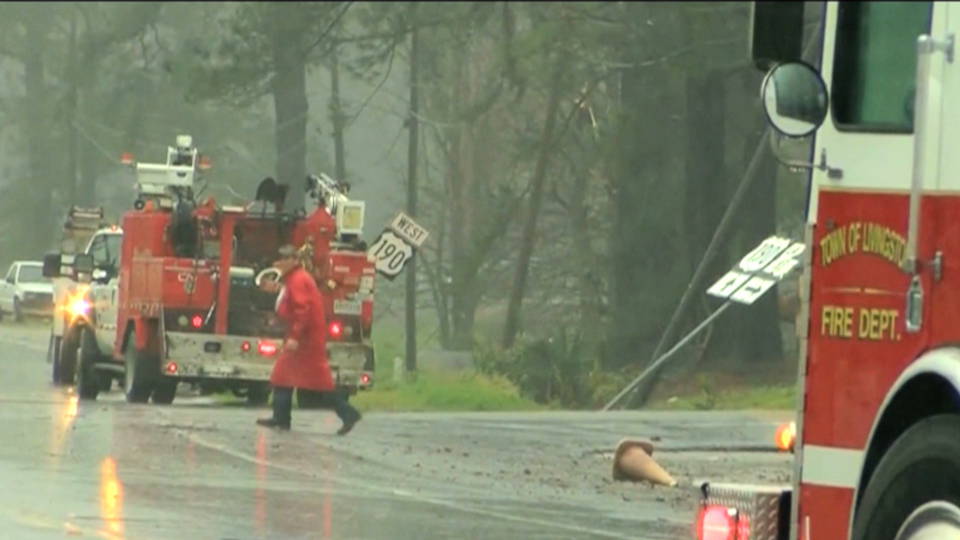
At least seven people have died as more than 50 tornadoes swept across parts of the South and eastern United States over the last two days. The extreme weather has destroyed hundreds of homes and forced the closure of schools and government offices. At least four people have died in Virginia, including a two-year-old boy. Virginia Governor Terry McAuliffe has declared a state of emergency. Scientists have linked an increase in the intensity and deadliness of tornadoes to climate change.
TOPICS:
Extreme Weather
Climate Change
Pentagon Contractors in Iraq Increases Eightfold over Last Year

New government documents show that the number of private contractors hired by the Pentagon in Iraq has increased eightfold over the past year. There are currently more than 2,000 private contractors working for the Pentagon in Iraq, up from only 250 contractors last year. This comes as the Pentagon has also increased the number of U.S. troops in Iraq, up to 3,700 soldiers.
TOPICS:
Iraq
Report Says Israeli Security Agency Is Abusing Palestinian Prisoners
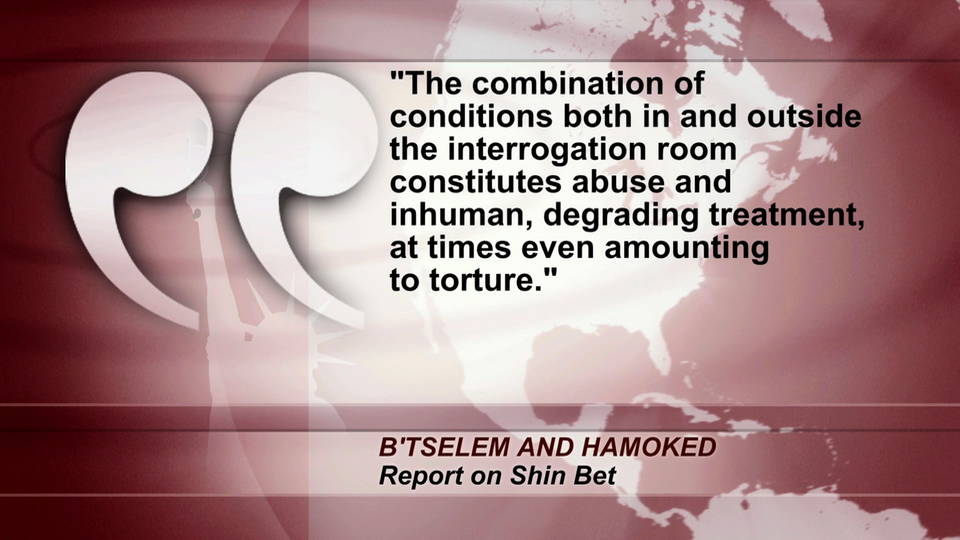
A new report by two Israeli human rights groups accuses the Israeli Shin Bet security agency of abusing dozens of Palestinian prisoners at the Shikma interrogation facility. The report, issued by the groups B’Tselem and HaMoked, says Palestinian prisoners are exposed to extreme heat or cold, deprived of sleep and denied sufficient food. It concludes, "The combination of conditions both in and outside the interrogation room constitutes abuse and inhuman, degrading treatment, at times even amounting to torture."
TOPICS:
Israel & Palestine
Activists Urge Oscar Nominees to Reject Free Trip to Israel
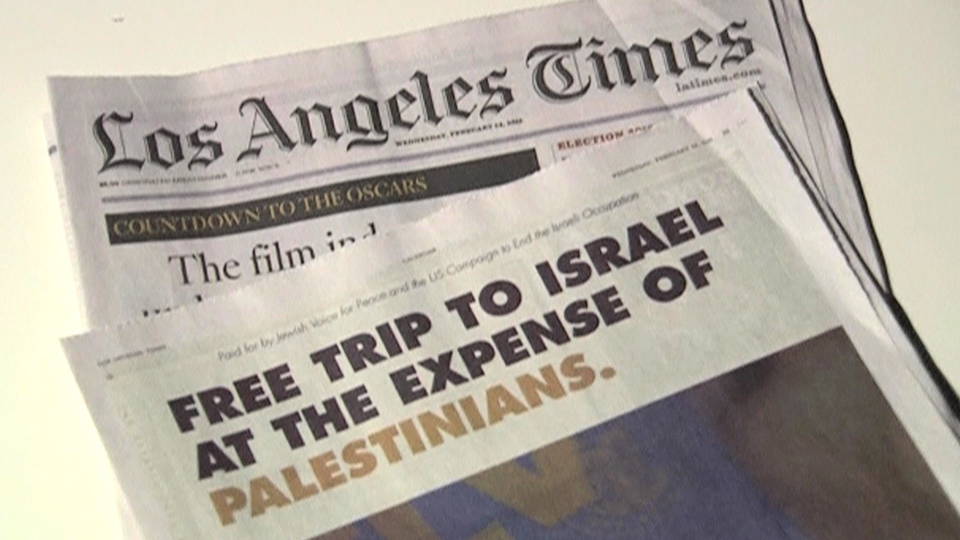
This comes as two U.S.-based groups have taken out a full-page ad in the Los Angeles Times urging Oscar nominees to skip a trip to Israel, which is being offered as part of an awards gift bag. The gift bag is being handed out by a marketing company and is not affiliated with the Academy of Motion Picture Arts and Sciences. Organizers say they are calling on Oscar-nominated directors and actors to skip the 10-day free trip because of Israel’s continued occupation of Palestinian territories. The trip is partially funded by the Israeli government.
TOPICS:
Israel & Palestine
Five Remaining Republican Candidates to Debate Tonight in Houston
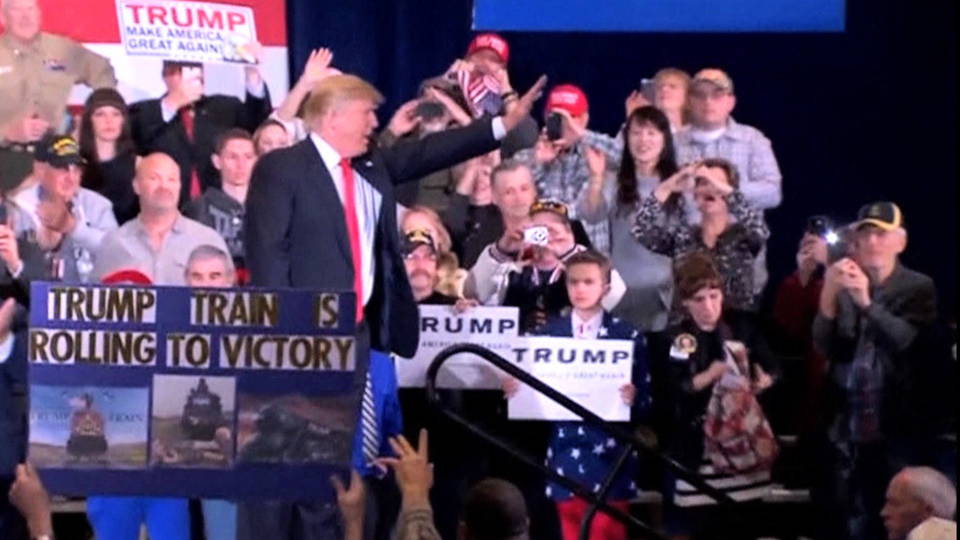
In news from the campaign trail, the five remaining Republican presidential candidates—real estate mogul Donald Trump, Texas Senator Ted Cruz, Florida Senator Marco Rubio, neurosurgeon Ben Carson and Ohio Governor John Kasich—will face off in Houston for the last debate before Super Tuesday. Donald Trump has won three of the four primaries and caucuses to date. On Tuesday, 11 states and the territory American Samoa will hold primary contests.
TOPICS:
2016 Election
#BlackLivesMatter Activist Interrupts Private Clinton Fundraiser
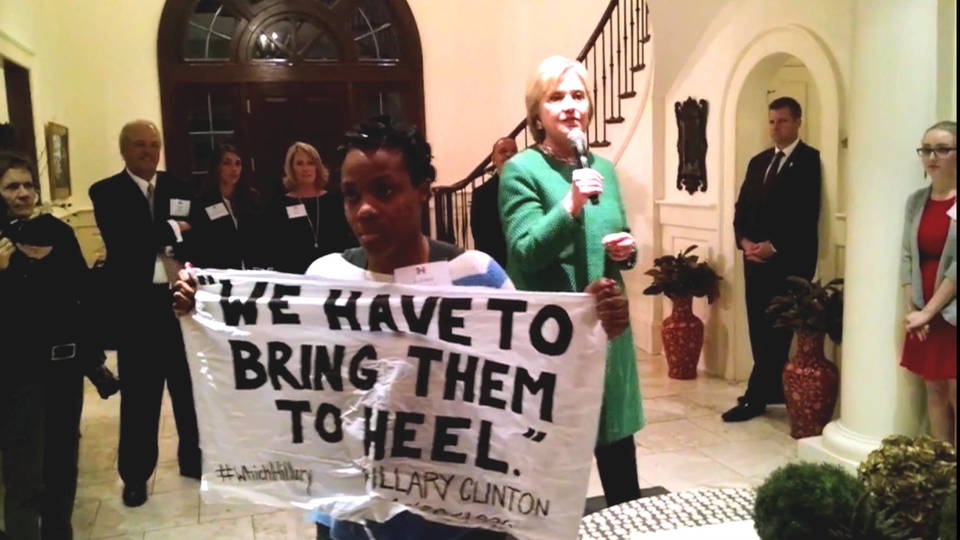
Meanwhile, a Black Lives Matter activist interrupted Democratic presidential candidate Hillary Clinton during a private fundraiser Wednesday night in Charleston, South Carolina. During the event, Ashley Williams held a banner reading "We have to bring them to heel"—a reference to controversial statements Clinton made in 1996 about some youth, whom she called "superpredators." Williams then confronted Clinton, saying, "I am not a superpredator."
Ashley Williams: "I’m not a superpredator, Hillary Clinton."
Hillary Clinton: "OK, fine. We’ll talk about it."
Ashley Williams: "Can you apologize to black people for mass incarceration?"
Hillary Clinton: "Well, can I talk? OK, and then maybe you can listen to what I say."
Ashley Williams: "Yes, yes, absolutely."
Hillary Clinton: "OK, fine. Thank you very much. There’s a lot of issues, a lot of issues in this campaign." [...]
Ashley Williams: "I know that you called black youth superpredators in 1994.
Please explain your record. Explain it to us. You owe black people an apology."
Hillary Clinton: "Well, I’ll tell you what, if you will give me a chance to talk, I’ll—I’ll [inaudible] something. You know what? Nobody’s ever asked me before. You’re the first person to ask me, and I’m happy to address it, but you are the first person to ask me, dear. Um, OK, back to the issues."
That was Black Lives Matter activist Ashley Williams confronting Hillary Clinton at a private fundraiser on Wednesday night. She was then escorted away. Williams says a friend contributed $500 so she could attend the private event.
TOPICS:
2016 Election
Black Lives Matter
Obama Considering NV Gov. Brian Sandoval for Supreme Court
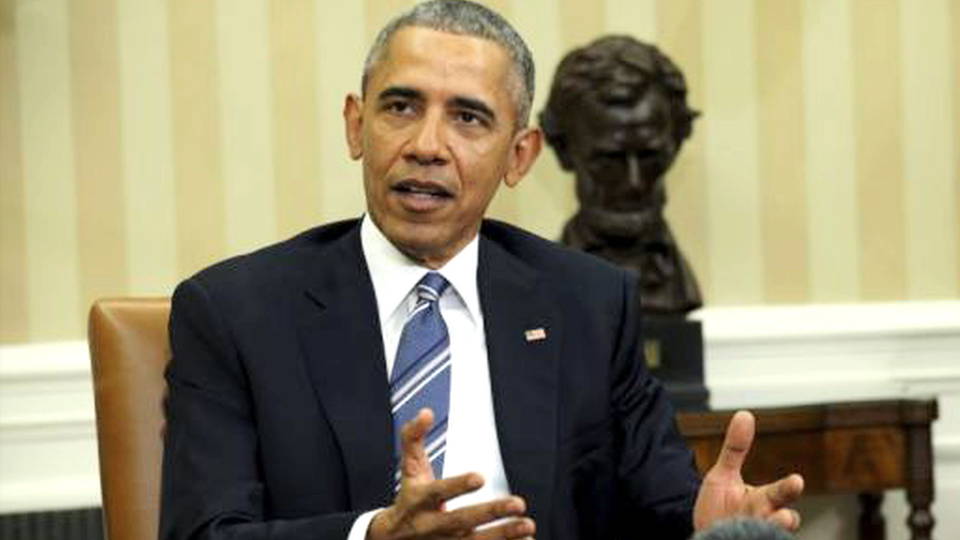
President Obama is reportedly considering Nevada Republican governor and former federal judge Brian Sandoval as a potential Supreme Court nomination, following the death of Justice Antonin Scalia. This comes as Republicans continue to say they will not consider any nominations put forward by President Obama.
TOPICS:
Supreme Court
Turkey: Protests Halt Construction of Copper Mine
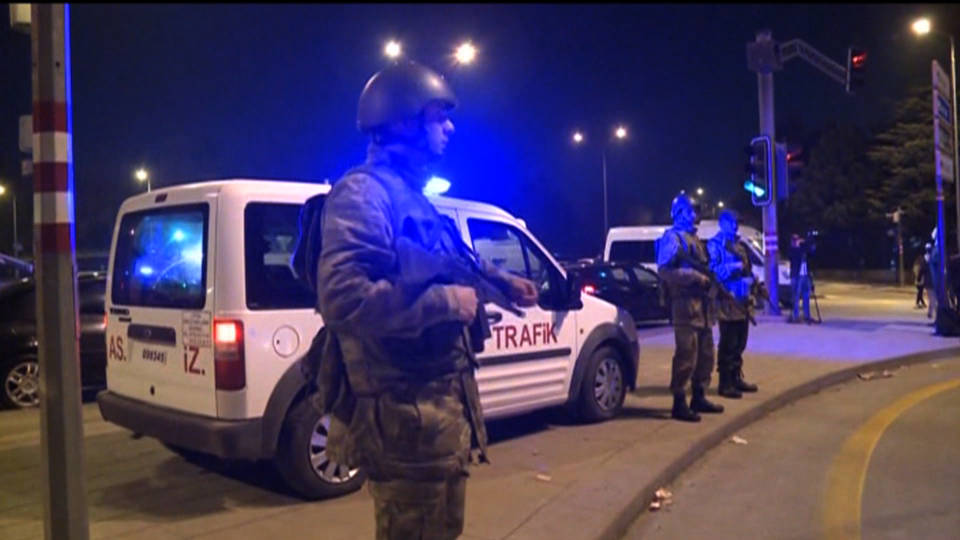
The Turkish government has halted the construction of a new copper mine amid massive protests by residents who fear the mine would destroy the local environment. Last week, protesters blocked a road to prevent construction trucks from accessing the mine site. On Wednesday, Turkey’s prime minister said the construction of the mine was on hold pending a court decision.
TOPICS:
Turkey
Environment
U.N. Says All Sides in Libya May Be Guilty of War Crimes
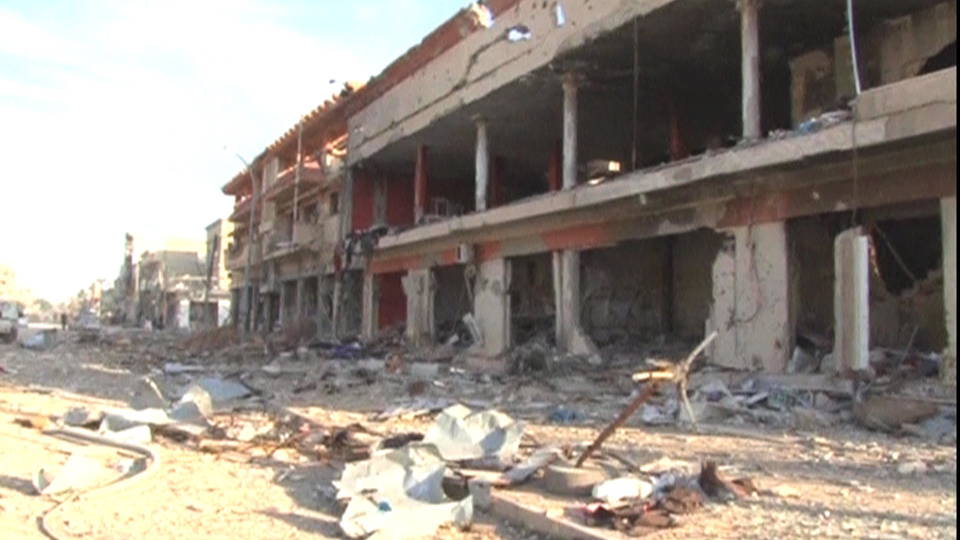
A new United Nations report says all sides in the Libyan conflict are likely guilty of war crimes, including torture, rape and the execution of prisoners. This comes as the Italian government has quietly begun allowing the U.S. military to use an airbase on Sicily to launch drones for U.S. military operations in Libya and across North Africa. U.S. officials say the use of the base is only for defensive operations, although the U.S. is seeking permission to also use the base for offensive operations, such as the strike last Friday which killed about 50 people, including two Serbian hostages.
TOPICS:
Libya
Bolivia: Morales Accepts Defeat in Referendum to Extend Term Limits
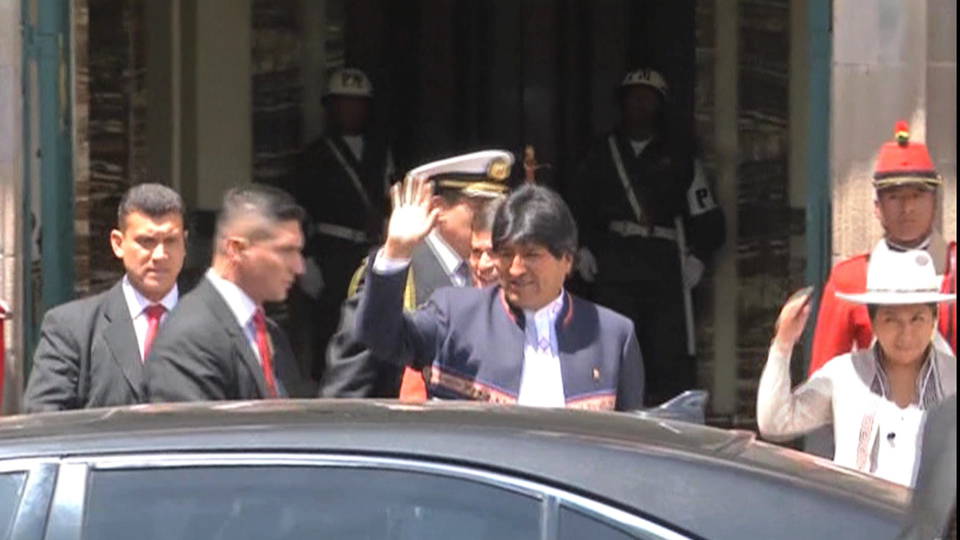
Bolivian President Evo Morales has acknowledged defeat in a referendum that would have allowed him a fourth term. Morales’ current term ends in 2020; the referendum would have allowed him to remain in power until 2025. On Wednesday, resident Óscar Solís celebrated the results of the referendum.
Óscar Solís: "We’re very happy for this day of victory. We thank the Bolivian people, because we have said no to corruption, no to the traffic of influences, no to the lies. The people don’t want our State Political Constitution to change. The people want new leaders."
TOPICS:
Bolivia
Mexican President Visits Iguala for 1st Time Since 43 Students' Disappearance
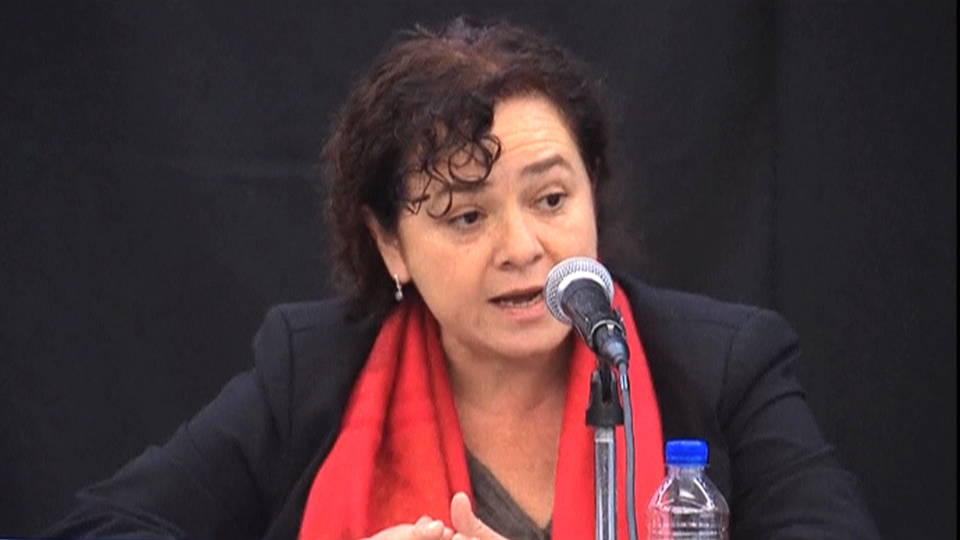
In Mexico, President Enrique Peña Nieto has visited the city of Iguala for the first time since 43 students disappeared from the city after being attacked by local police more than one year ago. During the visit, Peña Nieto avoided meeting with the families of the disappeared students, and he made only passing reference to the students during a military ceremony on Wednesday. The visit comes only days after a team of independent investigators held a news conference criticizing the Mexican government for continuing to block their inquiry into the students’ disappearance. Investigator Claudia Paz y Paz said the team was looking into the link between the disappearance and drug trafficking routes between Iguala and Chicago.
Claudia Paz y Paz: "For us, it is fundamental to deepen the line of investigation of the transfer of heroin from Iguala to Chicago. It has advanced, but we believe that it is necessary to continue with all the tasks that we have proposed within this line to clarify the events."
Claudia Paz y Paz is the former attorney general of Guatemala.
TOPICS:
Mexico
South Korea: "Ghost Rally" Protests Restrictions on Right to Assembly
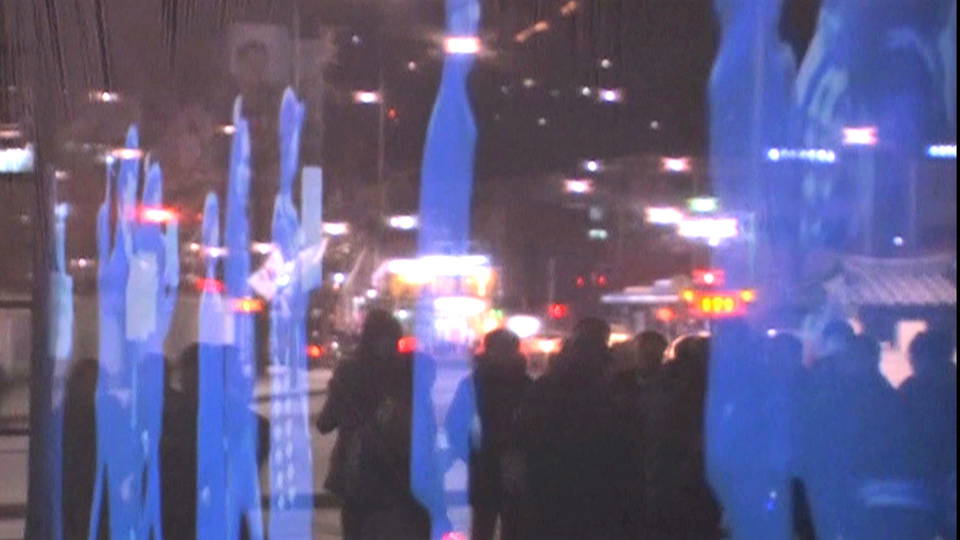
And in South Korea, organizers held a "ghost rally" to protest crackdowns on the right to assembly. On Wednesday, members of Amnesty International Korea projected holographic images of protesters holding signs and carrying flowers onto a screen in a public square in central Seoul. It was the first holographic protest in South Korea. Police are reportedly trying to decide whether the ghost rally violated the law and, if so, who to punish.
TOPICS:
South Korea
Protests
Donate today:
Follow:

"Thirsty for Democracy: The Poisoning of an American City": Complete Democracy Now! Special on Flint
DN! IN THE NEWS

"Albert Woodfox, the Last of the Angola Three, Is Finally Free" by Amy Goodman and Denis Moynihan
Albert Woodfox turned 69 years old Friday. He also was released from prison that day after serving 43 years in solitary confinement, more time than anyone in U.S. history. “Quite a birthday gift,” Woodfox told us on the “Democracy Now!” news hour, in his first televised interview after gaining his freedom. Woodfox is a living testament to the resilience of the human spirit when subjected to the cruel and unusual punishment of solitary. His case also serves as a stark reminder of the injustice that pervades the American criminal-justice system.
Woodfox was in his early 20s when he was imprisoned for armed robbery in 1971. He was sent to the notorious Louisiana State Penitentiary, known as Angola, a sprawling prison complex with 5,000 prisoners, located in rural Louisiana on the site of a former slave plantation. It gets its name, “Angola,” from the country of origin of many of those slaves.
Conditions in Angola in 1971 were so violent and appalling that Woodfox, along with another prisoner, Herman Wallace, formed one of the first prison chapters of the Black Panther Party. In 1972, Woodfox and Wallace were charged with the murder of prison guard Brent Miller. No physical evidence linked the men to the crime. A bloody fingerprint at the murder scene, which matched neither Wallace’s nor Woodfox’s, was ignored by authorities. Robert King, another prisoner who joined their Black Panther chapter, was charged with a separate crime in the prison. The three were sent to solitary confinement, where they remained for decades, always maintaining they were innocent of the charges.
Albert Woodfox recalled those early days of organizing inside of Angola when we spoke with him just days after his release: “The saddest thing in the world is to see a human spirit crushed. And that’s basically what happened with these young kids that was coming to Angola. And we decided that if we truly believed in what we were trying to do, then it was worth taking whatever measures necessary to try to stop this.”
Even back then, the Angola 3, as they became known, were well-aware of the potential impacts of solitary confinement. Woodfox recalled during our interview, “When we were first put in CCR [closed cell restriction] in ‘72, myself, Herman Wallace and Robert King, we knew that if we had any chance of maintaining our sanity and not allowing the prison system to break us, that we had to keep our focus on society and not become institutionalized.” When I asked Woodfox what he read in prison, he told me, “History books, books on Malcolm X, Dr. Martin Luther King, Frantz Fanon, James Baldwin.”
A movement grew, globally, to free the Angola 3, with Amnesty International and other organizations calling for their release. Documentaries were made about the case. In one, the widow of Brent Miller joined the call, saying in 2010, “These men, I mean, if they did not do this—and I believe that they didn’t—they have been living a nightmare for 36 years.”
Two major impediments to their freedom were prison warden Burl Cain and Louisiana Attorney General James “Buddy” Caldwell. Cain was the key decision-maker in keeping the men in solitary. In a 2008 deposition in Woodfox’s case, Cain admitted, “I still know that he is still trying to practice Black Pantherism.” And while Woodfox’s case was overturned on three separate occasions, with a federal judge ordering his release, Attorney General Caldwell insisted on repeatedly retrying the case. Cain resigned in December, facing state ethics violations and a criminal probe for business dealings during his reign as the longest-serving warden in Angola’s history. Caldwell lost re-election to fellow Republican Jeff Landry, who allowed Woodfox to leave prison on the condition that he plead “no contest” to manslaughter.
Woodfox squinted into the camera lens as he spoke on “Democracy Now!.” The years of confinement in a 6 by 9 foot cell had damaged his vision. He is proud of his activism. “We’ve put this solitary-confinement issue before American people, before the people of the world, and it just started building,” he said. “It got to the point where it wasn’t just about the Angola 3, but it was about solitary confinement.”
Robert King was released in 2001, his conviction overturned after serving 29 years in solitary confinement. Herman Wallace was freed in 2013, only after a federal judge threatened to jail Cain if he refused to release him. Wallace died one day later of liver cancer. On Monday, we asked Albert Woodfox about his future plans: “I’ve been locked up so long in a prison within a prison. So, for me, it’s just about learning how to live as a free person,” he told us. “I’m just trying to learn how to be free.”
WORK WITH DN!
Broadcast Engineer
Director of Finance and Operations
Director of Development
---------------------
207 West 25th Street, 11th Floor
New York, New York 10001, United States
---------------------
---------------------





No comments:
Post a Comment